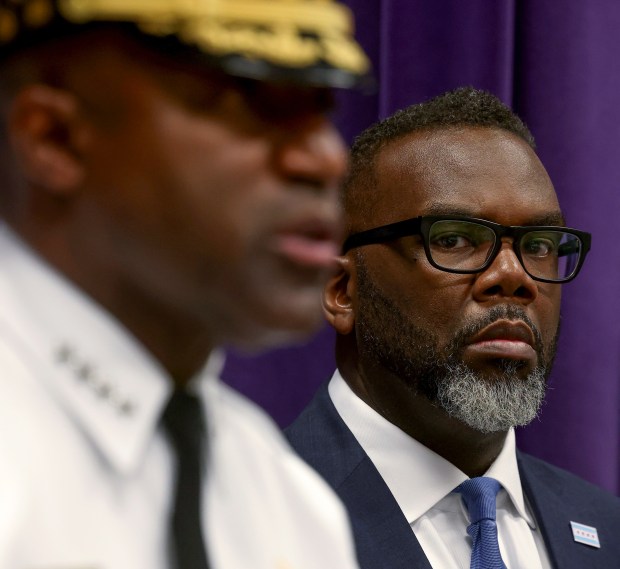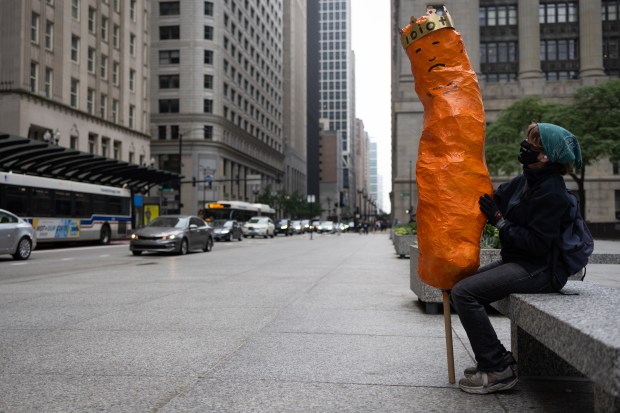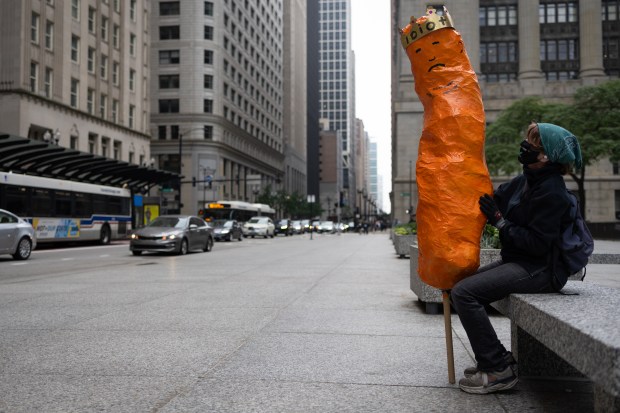After another long holiday weekend that saw scores of people killed or wounded by gunfire — many of them children — city leaders gathered at Chicago Police headquarters Monday morning to once again decry the city’s entrenched violence and call for accountability for those who carried out the shootings.
More than 100 people were shot in Chicago between Thursday July 4 and the end of the holiday weekend.
Nineteen people were killed, according to Chicago police. Among them: a brazen daytime shooting in Greater Grand Crossing on Thursday left two women and an 8-year-old boy, Bryson Orr, dead.
Mayor Brandon Johnson stressed that his administration has recently sought more federal funding to address root causes of violence, but still called for punishment for those who make “a choice to kill.”
“We are standing here today talking about a violent weekend because of generations of disinvestment,” Johnson said.
CPD Superintendent Larry Snelling also said he was wrestling with the disregard for human life demonstrated by those to carried out the shootings.
“What we really have to think about is the brazenness and the behavior of those who could walk into a home and see children and women and open fire,” Snelling said. “It’s an amazing thing to think that, as a human being, that you could walk in and do something like that, that you could see a child and open fire.”
Around 45 of those shootings occurred on July 5, according to Chicago police. Four mass shootings unfolded, starting in the early hours of July 4. Just after midnight the next day, eight people were shot in the 1300 block of West Hastings Street. Less than two hours later, seven people were shot in Austin, leaving one man dead.
The weekend’s final tally of violence, while jarring, was not out of line with long summer weekends of years past. Speaking Monday, CPD officials did not specify if any suspects were in custody in connection with any of the weekend’s violence.
The majority of the holiday weekend’s violence took place in pockets of the city that have been plagued by heightened gun violence for generations.
“When we think about this type of behavior, we think about the people in those communities. It is important to understand that, not only is the Chicago Police Department, but everyone in the city of Chicago, the mayor’s office, that we provide something,” Snelling added. “That we provide some type of comfort for those going through this on a daily basis. I think all too often we don’t recognize what people in these neighborhoods are going through.
Glen Brooks, CPD’s director of community policing, said the department will host an emergency assistance center Tuesday afternoon at Fosco Park — near the scene of the Hastings Street mass shooting — to offer resources and assistance to anyone affected by the city’s violence.
Large outdoor gatherings — commonplace throughout the city during the summer months — present unique challenges to officers, Snelling said. Day-long parties, often fueled by alcohol or other substances, can often exacerbate interpersonal disputes, often leading to gun violence.
“People who’ve been together all day, they come together as a group, they’ve been drinking, tempers flare and people decide that they’re going to air out their differences through violence,” Snelling said.
Johnson called for consequences for those involved.
“We need to ensure that we are holding every single individual accountable for the pain and trauma and the torment that they have caused in this city,” he added. “There will be consequences. There will be consequences for the violence. We will not let criminal activity ruin and harm our city.”
Offenders make choices and violence is the result, the mayor said.
“This is a choice. It’s a choice to kill. It’s a choice to kill women. A choice to kill children. A choice to kill the elderly,” Johnson said. “These are choices that the offenders made and they calculated.”





